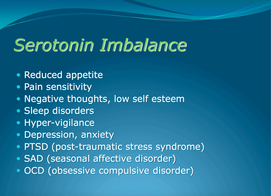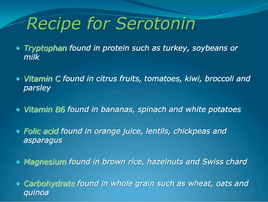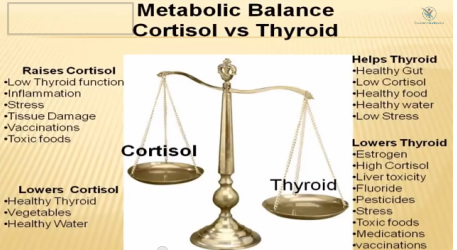
How to keep a healthy thyroid and adrenals
Dr.John Bergman talks about the balance between these two amazing glands.
Dr.John Bergman talks about the balance between these two amazing glands.
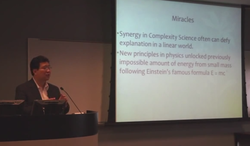
Transitioning to Integral Medicine or The Western Healthcare Paradigm by Dr. Yoon Hang John Kim MD, MPH, FAAMA
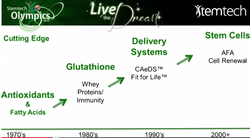
Dr. Somersall - Stemtech Convention 2012
The cutting edge of nutrition. Dr. Allan Somersall talks at the Stemtech Convention in 2012.
The cutting edge of nutrition. Dr. Allan Somersall talks at the Stemtech Convention in 2012.
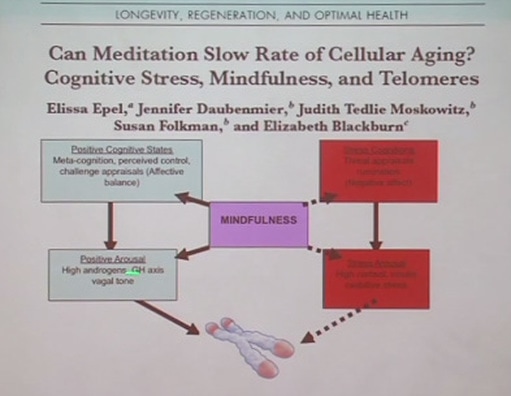
Emotions Stress and Rate of Telomere Shortening:
Are Our Cells Listening to Us?
University of California Television (UCTV)
How we can measure stress in looking at telomere length and what we can do to reduce negative stress when we are hard wired by evolution to detecting stress?
By using practices to re-train our attitudes to life we can influence our messenger system i.e hormone production and the hormone receptor sensitivity on cells and thus affect the ageing of our cells.
Dr.Elissa Epel UCSF department of psychiatry describes in accessible language the effects that chronic stress has on our cells, starting from conception. Chronic stress can be physical , emotional, psychological and/or spiritual. In all cases it will have a detrimental effect on the life of our cells.
What does it mean to be in a constant state of hyper arousal ? How does this affect us on a cellular level? How do raised levels of insulin and cortisol and high oxidative stress cause more wear and tear and accelerated ageing of cells? (right side of slide in red)
Are Our Cells Listening to Us?
University of California Television (UCTV)
How we can measure stress in looking at telomere length and what we can do to reduce negative stress when we are hard wired by evolution to detecting stress?
By using practices to re-train our attitudes to life we can influence our messenger system i.e hormone production and the hormone receptor sensitivity on cells and thus affect the ageing of our cells.
Dr.Elissa Epel UCSF department of psychiatry describes in accessible language the effects that chronic stress has on our cells, starting from conception. Chronic stress can be physical , emotional, psychological and/or spiritual. In all cases it will have a detrimental effect on the life of our cells.
What does it mean to be in a constant state of hyper arousal ? How does this affect us on a cellular level? How do raised levels of insulin and cortisol and high oxidative stress cause more wear and tear and accelerated ageing of cells? (right side of slide in red)
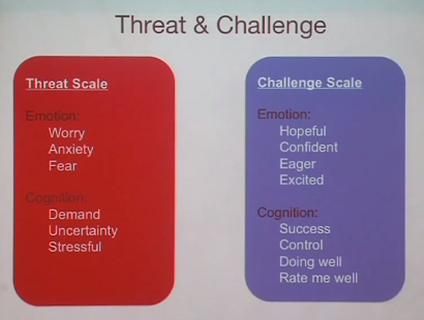
How can using mindfulness help us coping better with stress and turn on a different more positive physiological response? ie. high anabolic hormones and high vagal tone might be more characteristic of positive states of arousal.
Why do 2 different people respond very differently to the exact same stimuli? Why do some people feel negatively challenged, feel threatened, ashamed and blame themselves and thus make their cortisol go up dramatically and other people have a more resilient response, feeling that they can handle the situation and feel more positively challenged by it?
She measures threat and challenge. If you are high on demand and low on resources you are feeling threat. Conversely if you have a lot of resources (ability to do task or friends to call on) and low demands you feel more positively challenged.
The study found that people with very little threat tended to have longer telomeres and less cellular ageing than those with feelings of threat when confronting a task.
Attitudes become very habitual and ingrained during our lives and that affects the shape of our telomeres.
Why do 2 different people respond very differently to the exact same stimuli? Why do some people feel negatively challenged, feel threatened, ashamed and blame themselves and thus make their cortisol go up dramatically and other people have a more resilient response, feeling that they can handle the situation and feel more positively challenged by it?
She measures threat and challenge. If you are high on demand and low on resources you are feeling threat. Conversely if you have a lot of resources (ability to do task or friends to call on) and low demands you feel more positively challenged.
The study found that people with very little threat tended to have longer telomeres and less cellular ageing than those with feelings of threat when confronting a task.
Attitudes become very habitual and ingrained during our lives and that affects the shape of our telomeres.
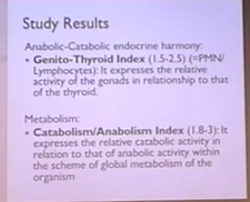
Endobiogeny: Research on Cancer by Dr.Kamyar Hedyat MD
This lecture discusses the first ever clinical study on the theory of Endobiogeny: "A novel use of biomarkers in the modeling of cancer activity based on the theory of Endobiogeny" by Buehning, Hedayat, Lapraz et. al, 2014, vol 3, issue 4: Global Advances in Health and Medicine Journal.
How I reversed my Parkinsons Symptoms by Dr.Gray.
A study printed in the International Journal of Internal Medicine was done with 254 Parkinson’s patients who were newly diagnosed, with no previous treatment, and those who were diagnosed more than 20 years before and had tried many other medical treatment options. It showed that these supplements were helpful in the treatment of Parkinson's Disease.
A study printed in the International Journal of Internal Medicine was done with 254 Parkinson’s patients who were newly diagnosed, with no previous treatment, and those who were diagnosed more than 20 years before and had tried many other medical treatment options. It showed that these supplements were helpful in the treatment of Parkinson's Disease.
Dean Ornish & Vinod Khosla, moderated by David Ewing Duncan
The Future of Innovation, Technology and Humans - Fusing health, IT and biomedicine
The role of doctors will have to change when technology can diagnose better than humans
How to support the wisdom of the body & we can't predict the rate of innovation
The Microbiome Live Dirty, Eat Clean!
Why The Microbiome Is The Future Of Medicine: Dr. Robynne Chutkan
We've all heard about the microbiome, but what is it? Why should we care? And, most importantly, what should we do about it? Integrative gastroenterologist Dr. Robynne Chutkan breaks down what you need to know about the microbiome, the vast collection of microbes that live in and on your body, and how you can optimize your gut health to live a longer, better life.

